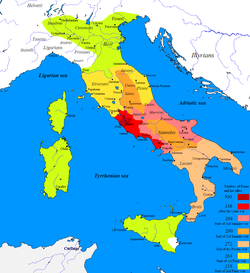This article needs additional citations for verification .(February 2024) |
| Years |
|---|
| Millennium |
| 1st millennium BC |
| Centuries |
| Decades |
| Years |
| 272 BC by topic |
| Politics |
|---|
| Categories |

Year 272 BC was a year of the pre-Julian Roman calendar. At the time it was known as the Year of the Consulship of Cursor and Maximus (or, less frequently, year 482 Ab urbe condita ). The denomination 272 BC for this year has been used since the early medieval period, when the Anno Domini calendar era became the prevalent method in Europe for naming years.